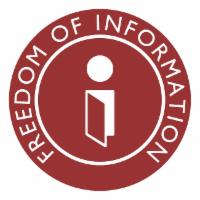Michigan voters to rule on changes to legislative term limits
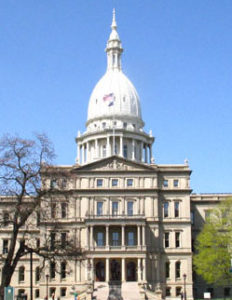 The Michigan Legislature approved a ballot proposal this week that would let voters decide on term limit changes to House and Senate members in November. The House voted in favor, 76-28, of the proposal and the Senate voted in favor the same day, 26-6. Both chambers gave approval without debate or discussion.
The Michigan Legislature approved a ballot proposal this week that would let voters decide on term limit changes to House and Senate members in November. The House voted in favor, 76-28, of the proposal and the Senate voted in favor the same day, 26-6. Both chambers gave approval without debate or discussion.
Advocates would have needed to collect 425,000 signatures to move to the ballot had the Legislature not acted. The proposal also includes changes to financial disclosure requirements of the Legislature; however, language passed by both Legislature requires far fewer financial details than what has been called for by activists.
Under the existing constitutional term limits approved by voters in the 1990s, an individual can serve a total of 14 years at the State Capitol, with a maximum of three 2-year terms in the House and two 4-year terms in the Senate.
Under the ballot proposal this fall, the total years would be reduced to 12; however, an individual could serve all of those years in a single chamber.
The proposal does not have any effects on the number of terms a person may serve as a county commissioner.
MAC is reviewing the approved language and has not taken a position on it.
For more information on this issue, contact Deena Bosworth at bosworth@micounties.org.
Medical care facilities win another round on key funding measure
 The Senate Health Policy Committee, chaired by Sen. Curt VanderWall (R-Mason), unanimously approved this week a three-year extension to the county maintenance of effort (MOE) rate for county medical care facilities (MCFs), a key legislative priority for the Michigan County Medical Care Facilities Council (MCMCFC).
The Senate Health Policy Committee, chaired by Sen. Curt VanderWall (R-Mason), unanimously approved this week a three-year extension to the county maintenance of effort (MOE) rate for county medical care facilities (MCFs), a key legislative priority for the Michigan County Medical Care Facilities Council (MCMCFC).
House Bill 5875, by Rep. Bronna Kahle (R-Lenawee), provides an extension to the MOE freeze until 2025, or until the Michigan Department of Health and Human Services (MDHHS) implements a new reimbursement model, whichever is sooner.
MDHHS has been studying and contemplating a new reimbursement model and policies for long-term care facilities. Should a new approach be implemented prior to Dec. 31, 2025, MCFs would transition to the new system under the bill.
Other organizations supporting the bill alongside MCMCFC include MAC, the Health Care Association of Michigan and Leading Age Michigan.
The bill now heads to the Senate floor to await a vote by the full body.
For more information on this issue, contact Meghann Keit-Corrion at keit@micounties.org.
Clare, Oakland, Macomb, Washtenaw, Wayne claim NACo Achievement Awards
 Five Michigan counties were among those honored recently by the National Association of Counties in its 2022 Achievement Awards. The Achievement Awards program is a non-competitive awards program that seeks to recognize innovative county government programs. One outstanding program from each category will be selected as the “Best of Category.”
Five Michigan counties were among those honored recently by the National Association of Counties in its 2022 Achievement Awards. The Achievement Awards program is a non-competitive awards program that seeks to recognize innovative county government programs. One outstanding program from each category will be selected as the “Best of Category.”
Macomb County led with 12 citations, including seven in the criminal justice field alone.
Oakland County received 11 citations in six different categories for work that included vaccination promotional efforts, a school nurse program and a “Blueprint for Successful Aging.”
Clare and Wayne counties were honored for their work in community and economic development, while Washtenaw County was cited for financial management via its “sustainable investments to preserve natural areas.”
To see descriptions of Best of Category winners nationally and a searchable database of this year’s winners, click here.
Treasury to announce awards for first responder recruitment grants

Counties should learn early next week if they are among recipients of first responder recruitment grants issued by the Michigan Department of Treasury.
MAC has learned that awards will reach 44 of our 83 counties. The list of recipients should be available within the next two business days and follow-up letters will be sent out to all communities that applied for the funding.
Treasury received more than 400 applications from local units of government seeking a portion of the $5 million allocated by the Legislature in December 2021 for first responder recruitment and training grants. In total, applications requested more than $29 million, so the program is highly competitive.
Per legislative directive, the department reviewed and ranked all applications according to intended use of the funds and those communities most in need. Funding for recruitment and training was given the highest priority, then the applications were ranked based on those with the lowest taxable value per capita across the state.
For more information on this issue, contact Deena Bosworth at bosworth@micounties.org.
Seven Michigan county staffers finish leadership academy
 Seven Michigan county staff members recently finished their course work in the NACo Leadership Academy, a 12-week online program that empowers front-line county government employees with fundamental leadership skills. Across the country more than 4,600 county employees have participated; this includes 75 from Michigan.
Seven Michigan county staff members recently finished their course work in the NACo Leadership Academy, a 12-week online program that empowers front-line county government employees with fundamental leadership skills. Across the country more than 4,600 county employees have participated; this includes 75 from Michigan.
Michigan county staff to complete the Academy this April are:
- Rebecca Johns, county veteran service officer, Alger County
- Patrick Mellon, jail administrator / sergeant, Alger County
- Matthew Newton, deputy county administrator, Cass County
- Michael Turisk, director of planning and zoning, Cheboygan County
- Elizabeth Zabik, equalization director, Cheboygan County
- Chris Roberts, system administrator-network/security, Grand Traverse County
- Amber Weber, building official, Leelanau County
“At the beginning of the course I was actually struggling with the direction of my future,” said one course participant. “This course provided me with some very valuable insight and thought processes to empower me to be a better leader. The best part was today at lunch, a colleague mentioned that I was somber, and she didn’t like it. I simply told her that I do not see a need to get worked up over some things. This course has helped me to mature as leader.”
Congratulations to all these individuals who completed the program. To learn more about the Academy, click here. Registration for the next cohort is now open.

MAC interns end year with ‘modeling gig’
We said goodbye this month to our 2021-22 interns, Noah Peterson and Will Hansen, but not before assigning them one final task: modeling our new “83” brand T-shirt that soon will be on sale at MAC’s Lansing offices and MAC conferences.
If you are interested in an “83” shirt, send an email to dozier@micounties.org.
Free MDHHS webinar to focus on crisis response
 A May 24 webinar, part of the Interdisciplinary Partnership Series led by the Michigan Department of Health and Human Services (MDHHS), will focus on crisis response collaboration efforts within the state of Michigan. Representatives from MCOLES, MDHHS, the Center for Behavioral Health and Justice, CIT International and The Cardinal Group II will share information related to crisis response partnerships, associated data and information and training opportunities for first responders, law enforcement and behavioral health staff.
A May 24 webinar, part of the Interdisciplinary Partnership Series led by the Michigan Department of Health and Human Services (MDHHS), will focus on crisis response collaboration efforts within the state of Michigan. Representatives from MCOLES, MDHHS, the Center for Behavioral Health and Justice, CIT International and The Cardinal Group II will share information related to crisis response partnerships, associated data and information and training opportunities for first responders, law enforcement and behavioral health staff.
The webinar, which runs from 10:30 a.m. to 12 p.m., is free through MDHHS.
To register, go to https://attendee.gotowebinar.com/register/1479027180761863696.
For information, contact J. Eric Waddell at jericwaddell@thecardinalgroup2.com.
 Staff picks
Staff picks
- Internet service essentially free for millions under new Biden program (RouteFifty)
- Opinion: Opioid settlement money is coming. How we spend it is critical. (Governing magazine)
- Michigan Road Construction Map (Michigan Department of Transportation)
- Influx of calls to suicide prevention hotline could test some states (RouteFifty)
FOIA bills threaten integrity of public bodies
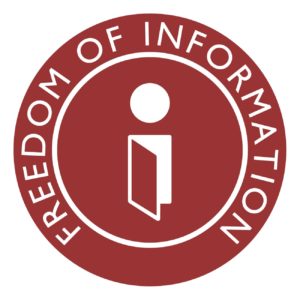 Legislation that alters the Freedom of Information Act in ways detrimental to county government will be up before the House Committee on Oversight (Chair Steve Johnson) next week and MAC needs your voice to urge the House to set aside this ill-advised package.
Legislation that alters the Freedom of Information Act in ways detrimental to county government will be up before the House Committee on Oversight (Chair Steve Johnson) next week and MAC needs your voice to urge the House to set aside this ill-advised package.
Among the problems in the package are provisions to impose penalties on public bodies when mistakes are made, an inevitable increase in costs for compliance with the act and the removal of the anonymity of volunteer task force members when serving their communities.
House Bill 5921, by Rep. Steve Johnson (R-Kent), limits the reason for FOIA request denial to only the ones(s) stated in the beginning. This amendment could have the unintended consequences of releasing protected records if someone didn’t catch the right exemption the first time and could potentially force a local agency to violate other laws. MAC anticipates an amendment that will also require a $500 penalty payable to the requestor should a public body deny a request for the wrong reason.
House Bill 5923, by Rep. Greg VanWoerkom (R-Muskegon), requires the public body to acknowledge that exempt records exist and provide a description of the record. These amendments will likely require public bodies to consult legal counsel in each record request denial. In addition, this change has the potential of exposing private information that the law was originally intended to protect, especially in cases of mental health allegations, sexual assault allegations, legal opinions and law enforcement investigations, these disclosure requirements undermine the intent of the privacy exemptions.
House Bill 5924, by Rep. Andrew Fink (R-Hillsdale), requires that a record in the possession of outside legal counsel be considered to be in the possession of the public body. This amendment blurs the line over what is FOIA-able in an outside legal practice.
House Bill 5925, by Rep. Bryan Posthumus (R-Kent), allows for civil actions regarding the determination of whether the record is considered primarily for the public benefit and therefore should not be subject to fees for compiling the record. Again, these amendments would open the floodgates of litigation against public bodies, especially by the press who would claim public benefit for every request. Then the public body would likely have to absorb the entire cost of fulfilling these requests to avoid litigation.
MAC is opposed to these bills as written and urges county leaders to use our advocacy platform to send a pre-drafted message of opposition to your House member before next week’s hearings.
For more information on this issue, contact Deena Bosworth at bosworth@micounties.org.
Veterans property tax reimbursement bills stalled in Senate; your voice needed now
 Long-sought legislation to properly reimburse local governments for losses due to the state’s property tax exemption for disabled veterans remain stalled in the Senate.
Long-sought legislation to properly reimburse local governments for losses due to the state’s property tax exemption for disabled veterans remain stalled in the Senate.
Senate Bills 783-84, by Sen. Jon Bumstead (R-Newaygo), are the culmination of years of negotiations between counties, other local government organizations, veterans organizations and the Legislature. These bills signify the first time we have all been able to rally around a method for reimbursing local units for their losses due to the veterans exemption.
The bills provide a reimbursable income tax credit, payable to the local unit, in the amount of the exemption granted to eligible veterans. Nothing in this legislation alters the benefit, nor does it require any additional steps for the disabled veteran. It is a win-win for veterans and locals.
Nevertheless, although the bills passed out of committee in early March, no action has been taken on the Senate floor on them due to opposition from the Whitmer administration, which is not too keen on the state paying for the consequences of state policy.
The annual loss to local revenues is estimated at nearly $100 million each year, and that amount is expected to increase as property values rise and veterans trade up for more expensive homes.
Your voice as a county leader is urgently needed to push the Senate into a vote on these bills before the Legislature reduces its meeting schedule for the summer.
To assist you, MAC has created a message of support which you can email directly to your senator with just a couple of clicks. If each county commissioner across the state contacted their senator in support of reimbursement, we would surely see the legislation move forward in Lansing.
For more information on this issue, contact Deena Bosworth at bosworth@micounties.org.
Podcast 83 resumes live episodes on May 16
 The Podcast 83 team will be live on Monday, May 16 to discuss what’s coming up for action in Lansing.
The Podcast 83 team will be live on Monday, May 16 to discuss what’s coming up for action in Lansing.
The update will begin at 4 p.m. To join the session, just use this Zoom link: https://us02web.zoom.us/j/82867692853.
Viewers will be able to ask questions of the team as well.
In their most recent episode, on May 2, the team discussed state budget news, veterans property tax exemption legislation and the ongoing work of MAC’s six policy committees. Click here to view the video.
If you can’t catch any episode live, a recording will be posted later next week to MAC’s YouTube channel.
And you always can find details about any Podcast 83 episode on the MAC website.
Report: Quarter of ‘federal aid’ roads in ‘good’ condition
 Michigan made some progress in addressing road conditions in 2021, says a new report from the Transportation Asset Management Council.
Michigan made some progress in addressing road conditions in 2021, says a new report from the Transportation Asset Management Council.
In its 2021 Annual Report, the council says Michigan has “… the highest percent of roads rated in good condition since 2005.
“The 2021 condition data for Michigan’s federal-aid eligible paved roads has made progress with
- 25% Good
- 42% Fair, and
- 33% in Poor condition.
In 2020, estimated breakdown was
- 22% Good,
- 36% Fair, and
- 42% were in Poor condition.
“This improvement in road surface condition,” the report says, “may be due in part to several factors including a mix of fixes of road surface treatments and increased revenue. The reasons for this improvement will be analyzed further and better understood as the 2021 project data becomes available.”
By contrast, conditions with Michigan’s bridges declined in 2021, with 4 percent of them falling into the “severe” category, which “measures the criticality and is a warning that these structures are in jeopardy for closure due to structural concerns that could pose a threat to traffic.”
The council is an appointed group that advises state officials on infrastructure. Kelly Jones, Ingham County Road Department managing director, is the MAC representative on the council.
Treasury launches improved document search site

The Michigan Department of Treasury is launching a new and improved Document Search site to provide greater access to local unit audit reports and other related financial information, the department announced this week.
“The Document Search site is a public online repository of document submissions and determinations for local units of government. For example, individuals can view a local unit’s audit or the determination of a local unit’s prior-approval application for borrowing.
“The new Document Search site retains all the previous features while adding new ways to search. New features include:
- “Search Bar: Type the name of the desired municipality instead of selecting from several cascading dropdowns
- “Document Groups: Related documents are grouped together into categories, like audit, finance and retirement
- “Improved Interface: Visual modernization and accessibility improvements
“Effective June 3, 2022, access to the old Document Search site will cease. Individuals are encouraged to add the new site to their browser’s favorites and replace any favorites directing to the old site by June 3, 2022.
“To access the Document Search site via our website, visit www.michigan.gov/localfinancialreporting. Afterward, click on the ‘Document Search’ button.”
Behavioral health effort expands to more Michigan counties
 The Michigan Department of Health and Human Services (MDHHS) has expanded the Behavioral Health Home (BHH) initiative to more Michigan counties to provide intensive care management and coordination services for Medicaid beneficiaries with a serious mental illness (SMI) or serious emotional disturbance (SED).
The Michigan Department of Health and Human Services (MDHHS) has expanded the Behavioral Health Home (BHH) initiative to more Michigan counties to provide intensive care management and coordination services for Medicaid beneficiaries with a serious mental illness (SMI) or serious emotional disturbance (SED).
“The expansion of the BHH will help address the complexity of physical and behavioral health conditions in Michigan and improve access to essential services,” said Elizabeth Hertel, director of MDHHS. “For enrolled beneficiaries, the Health Home will function as the central point of contact for directing patient-centered care across the broader health care system.”
The U.S. Centers for Medicare & Medicaid Services (CMS) recently approved Michigan’s State Plan Amendment (SPA) to expand its BHH initiative into five counties within two Prepaid Inpatient Health Plan regions (PIHP): CMH Partnership of Southeast Michigan and Detroit Wayne Integrated Health Network. The expanded SPA will allow thousands of Medicaid beneficiaries meeting the eligibility criteria to receive BHH services.
The Behavioral Health Home is a benefit offered to Medicaid beneficiaries who have been diagnosed with a serious mental illness or a serious emotional disturbance and reside within one of the following PIHP regions/counties:
- NorthCare Network (counties in the Upper Peninsula)
- Northern Michigan Regional Entity (21 northernmost counties of the Lower Peninsula)
- CMH Partnership of Southeast Michigan (Lenawee, Livingston, Monroe, Washtenaw)
- Detroit Wayne Integrated Health Network (Wayne)
- Oakland Community Health Network (Oakland)
Individuals who meet the criteria can work with a team of providers who will attend to the beneficiary’s complete health and social needs. Participation is voluntary and enrolled beneficiaries may opt out at any time.
According to a 2019 report, half of Michigan Medicaid beneficiaries with a mental illness do not receive needed treatment in a given year. Behavioral Health Homes are a proven model to increase access to coordinated and integrated care, which is especially important during the COVID-19 pandemic.
For BHH information, including eligibility and available resources, visit Michigan.gov/BHH.
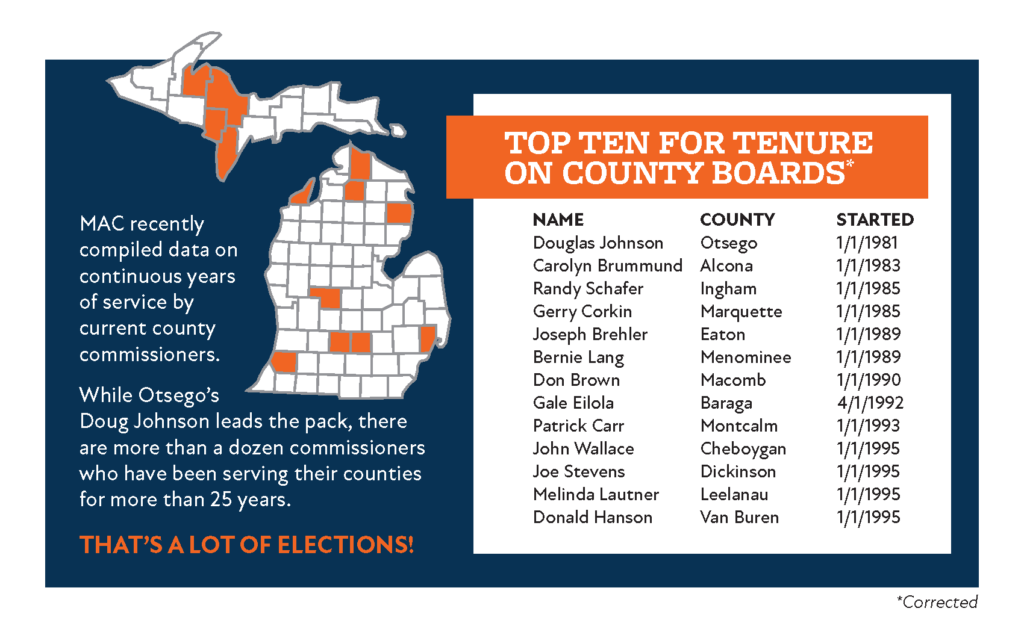
MAC corrects list of 10 longest-serving current commissioners
Due to an editing error, Alcona’s Carolyn Brummund was left off the list of longest-serving commissioners published in the April 2022 edition of Michigan Counties. MAC regrets the error.
 Staff picks
Staff picks
- Up North businesses are buying housing just to lure summer staff (Bridge magazine)
- Who’s at fault for Midland dam failures? Pretty much everyone, report says (Bridge magazine)
- States and cities are moving to make virtual hearings permanent (RouteFifty)
- ‘Anatomy of a Murder’ to be performed in historic (Lapeer) courthouse (The County Press)
MAC applauds Senate work on revenue sharing; House plan disappoints
 A 10 percent boost in county revenue sharing took another step to enactment this week when the Senate Appropriations Committee passed out the fiscal 2023 General Government budget.
A 10 percent boost in county revenue sharing took another step to enactment this week when the Senate Appropriations Committee passed out the fiscal 2023 General Government budget.
Senate Bill 831, by Sen. Roger Victory (R-Ottawa), calls for a 5 percent ongoing increase in revenue sharing and a 5 percent one-time bump. The budget bill mirrors the governor’s recommendation on county revenue sharing of $243 million for FY23.
The House Appropriations Committee also passed out its General Government FY23 budget this week. House Bill 5783, by Rep. Greg VanWoerkom (R-Muskegon), however, does not support the governor’s recommendation. Instead, it calls for a one-time increase of 1 percent in revenue sharing and a 1 percent ongoing increase.
Although MAC appreciates any increase in revenue sharing for counties, the House recommendation is a disappointment and does not help rectify decades of underinvestment. MAC applauds the Senate Appropriations Committee for supporting the governor’s recommendation to include an unprecedented increase in revenue sharing for counties.
Both bills sit on their respective chamber floors, with votes expected next week. According to statute, the state budget must be finalized by July 1 each year for the new fiscal year that begins Oct. 1.
For more information on this issue, contact Deena Bosworth at bosworth@micounties.org.
House panel moves $33 billion budget for health, human services
 Michigan would spend $33 billion in state and federal funds for health and human services in fiscal 2023 under a budget bill approved this week by the House Appropriations Subcommittee on Health and Human Services.
Michigan would spend $33 billion in state and federal funds for health and human services in fiscal 2023 under a budget bill approved this week by the House Appropriations Subcommittee on Health and Human Services.
The subcommittee, chaired by Rep. Mary Whiteford (R-Allegan), recommended the sum for the state’s largest agency. Notably, the amount includes $85 million for constructing a new intensive inpatient psychiatric services center for children and adolescents, down considerably from the governor’s recommendation to spend $325 million for a replacement and expansion of current facilities at the Hawthorn Center and Walter Reuther Hospital.
The budget plan includes a variety of one-time expenditures using the state’s allocation from the American Rescue Plan, including:
- $50 million to Pine Rest pediatric behavioral health center
- $45 million to Detroit Wayne Integrated Health Network psychiatric campus
- $5 million for a Northern Michigan psychiatric inpatient facility
- $30 million for establishing crisis stabilization units
A large investment of $101 million, in line with the governor’s recommendation, would go to certified community behavioral health clinics that would improve vital services by increasing access to evidence-based substance use and mental health treatment services, including 24/7 crisis care.
Additionally, the subcommittee recommended $5 million in state General Fund dollars to replace a like amount of county funding used for Medicaid mental health supports and services, which brings the state to year 3 of a 5-year phaseout plan.
The budget also includes $279 million for the Child Care Fund, with an additional $3.5 million for indirect costs, and $17 million for the Raise the Age Fund, which also is line with the governor’s recommendation.
The bill has been sent by the full Appropriations Committee to the House floor for action next week.
For more information on this issue, contact Meghann Keit-Corrion at keit@micounties.org.
Legislature sends flawed public notice bills to governor
 A two-bill package to “modernize” public notice postings is headed to the governor after it gained final approval by the Michigan House of Representatives this week.
A two-bill package to “modernize” public notice postings is headed to the governor after it gained final approval by the Michigan House of Representatives this week.
Senate Bills 258, by Sen. Curt VanderWall (R- Mason), and 259, by Sen. Sylvia Santana (D- Wayne) would modify the definition of a newspaper to mean a newspaper in an adjoining jurisdiction if one was not available in the county. The bills would also require the posting of the notice on a website hosted by the newspaper. Although neither of the bills increase costs to counties or create additional burdens, they also don’t do anything to alleviate our current challenges with public notices. Neither of those modifications help to curb the cost of the postings, scale-back the unnecessary details of many of the posting requirements, nor do they assist locals in meeting the publicized notice timeline should a newspaper fail to print the notice in a timely manner.
MAC offered several amendments that were rejected. Those amendments were to limit the cost of the public notices to a government rate; to allow for partial posting of information with a link to more information; and to allow the posting online to count toward the deadline needed to meet notice posting timelines.
MAC will continue to advocate for statutory changes that will address our concerns.
For more information on this issue, contact Deena Bosworth at Bosworth@micounties.org.
NACo shares updates on April 30 ARP reporting deadline
 Counties are reminded that April 30 is the deadline for the U.S. Treasury’s ARP Recovery Fund Project and Expenditure (P&E) Reports.
Counties are reminded that April 30 is the deadline for the U.S. Treasury’s ARP Recovery Fund Project and Expenditure (P&E) Reports.
Additionally, earlier today, Treasury released new FAQs for the ARPA Recovery Fund Final Rule. NACo will provide a more in-depth analysis in the coming days but is able to share the following about the looming report deadline:
“Treasury has stated that it is experiencing a very high volume of messages about problems that recipients are having with submitting their P&E Reports, which has caused a delay in addressing these issues. Treasury has stated that if your county has sent an email to Treasury outlining why you are unable to submit your P&E Report, you will not be penalized if you submit AFTER April 30, 2022, if your problem is not addressed prior to that date. Please save a date stamped email and/or screen shot of your messages to Treasury!
If you are having an issue or are unable to submit your P&E Report, email both SLFRF@treasury.gov and covidreliefitsupport@treasury.gov and CC questions@naco.org with a description and screenshot of what the problem is.
If you are trying to submit your county’s P&E Report as the Authorized Representative, but the portal is stating it does not recognize your name/contact information, please watch the step-by-step walkthrough video released by Treasury. If the problem persists, email SLFRF@treasury.gov and covidreliefitsupport@treasury.gov and CC: questions@naco.org with a description and screenshot of what the problem is.
Counties are required to make a one-time, irrevocable election to either take the $10 million revenue loss standard allowance or calculate revenue loss. Counties must indicate this choice in this April P&E Report.
If your county is claiming the $10 million revenue loss standard allowance, please follow the below steps. Please note that there are streamlined reporting requirements for revenue replacement funds.
Steps for claiming $10 million standard allowance and reporting requirements
-
- Go to the “Project Overview” section
- Choose 6 – Revenue Replacement – under the “Project Expenditure Category Group”
- Choose EC 6.1 – Provision of Government Services – under the “Project Expenditure Category”
- Enter in Project Name
- If your county has not yet signed a contract, obligated or expended funds, select “My jurisdiction has no projects”
-
- Enter Recipient Project ID#
- Enter Total Cumulative Obligations
- Enter Total Cumulative Expenditures
- Enter Program Description
- SKIP the following modules:
- Subrecipients/beneficiaries/contractors
- Subawards/direct payments
iii. Expenditures
-
- Go to the “Recipient Specific” module
- Choose “Yes” under “Is your jurisdiction electing to use the standard allowance of up to $10 million, not to exceed your total allocation, for identifying revenue loss?”
- Enter in the amount you would like to claim in the field below “Revenue Loss Due to COVID-19 Public Health Emergency”
- For counties that receive less than $10 million in ARPA Recovery Funds and want to allocate the entirety of your allocation towards revenue loss, enter in your total allocation (total of first and second tranche) into this field
-
- Provide a description of how revenue replacement funds were allocated to government services
NACo has released a number of resources that walk counties through the P&E Report submission process, including:
Join Podcast 83 team live at 4 p.m. on May 2
 MAC Executive Director Stephan Currie and the Podcast 83 team of Deena Bosworth and Meghann Keit will be live on Monday, May 2 to discuss what’s coming up for action in Lansing.
MAC Executive Director Stephan Currie and the Podcast 83 team of Deena Bosworth and Meghann Keit will be live on Monday, May 2 to discuss what’s coming up for action in Lansing.
The update will begin at 4 p.m. To join the session, just use this Zoom link: https://us02web.zoom.us/j/82867692853.
Viewers will be able to ask questions of the team as well.
If you can’t catch the episode live, a recording will be posted later next week to MAC’s YouTube channel.
And you always can find details about any Podcast 83 episode on the MAC website.
House votes out treasurer fee bill backed by Zillow
 A bill to alter fees that county treasurers charge on parcel records is headed to the Senate after the full House approved it this week.
A bill to alter fees that county treasurers charge on parcel records is headed to the Senate after the full House approved it this week.
House Bill 4730, by Rep. Julie Calley (R-Ionia), was amended on the House floor to require county treasurers to provide property records in their possession, regardless of how many of the entire list of records they maintain. Originally the bill was tie-barred to other sections of law affected register of deeds offices and clerk offices but has since been scaled back to include just records held by county treasurers.
This bill appears to limit the revenue county treasurers collect for the dissemination of records for parcels of property. The bill was originally introduced as part of a package that would have carried the same limitations on fees for other county electronic records but has since been scaled back to just fees charged by treasurers.
Currently, a county treasurer can charge 25 cents per parcel record, which is not easily separated from the entirety of the parcel records, so it comes in a batch. Zillow is the primary advocate for this bill and the firm is seeking to make the process less costly and easier for it to use.
MAC continues to work with other organizations representing countywide elected officials as the bill begins consideration in the Senate.
For more information, please contact Deena Bosworth at bosworth@micounties.org.
Opioid settlement webinars set for May 3, 17
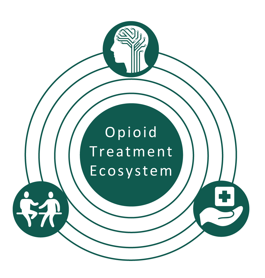 The Michigan Department of Health and Human Services (MDHHS), in partnership with MAC, the Michigan Attorney General’s Office and others will be hosting a webinar series on the Distributor/Janssen Opioid Settlements.
The Michigan Department of Health and Human Services (MDHHS), in partnership with MAC, the Michigan Attorney General’s Office and others will be hosting a webinar series on the Distributor/Janssen Opioid Settlements.
The next two webinars are:
- Treatment Services, May 3, 3 p.m. to 4 p.m. Click here to register.
- Prevention, May 17, 3 p.m. to 4 p.m. Click here to register.
After registering, you will receive a confirmation email containing information about joining the meeting.
State, county and local governments are slated to receive funds from the Distributor/Janssen Opioid Settlements in the coming months, and this webinar series will provide an opportunity for local elected officials, public health officials and other relevant parties to learn about best practices for spending these funds. This upcoming webinar will focus on opportunities to support treatment services.
You can post questions prior to each webinar by sending a note to MDHHS-OpioidsTaskForce@michigan.gov.
May 10 webinar will cover grant management, budgeting, more
 The Michigan Department of Treasury is pleased to announce our next Chart Chat webinar at 2 p.m. on Tuesday, May 10.
The Michigan Department of Treasury is pleased to announce our next Chart Chat webinar at 2 p.m. on Tuesday, May 10.
Topics covered will include:
- Grants Management Best Practices
- Treasury Updates American Rescue Plan Act – Alternative to Single Audit
- Qualifying Statements
- Budgeting
Participants can register and submit questions on the webinar’s registration page.
Presentations and recordings from this webinar, along with previous webinars, can be found at TREASURY – BLGSS Learning Center. Utilize TREASURY – Contact Information for support related to Treasury’s local government services.
 Staff picks
Staff picks
- All politics is national now, even in local government (ELGL)
- Will rescuing Middle America save democracy? (VOA News)
- Opinion: Michigan shouldn’t limit bail options for repeat offenders (Detroit News)
- Attorney General’s Office updates OMA, FOIA guides (Michigan Attorney General)
Senate panel signs off on 10% boost for revenue sharing
 A 10 percent increase for county revenue sharing for fiscal 2023 took another step toward enactment this week when the Senate Appropriations Subcommittee on General Government, chaired by Sen. Roger Victory (R-Ottawa), passed out its FY23 recommendations.
A 10 percent increase for county revenue sharing for fiscal 2023 took another step toward enactment this week when the Senate Appropriations Subcommittee on General Government, chaired by Sen. Roger Victory (R-Ottawa), passed out its FY23 recommendations.
Included in this budget is a recommendation to support the governor’s proposed increase for county revenue sharing. The plan would give counties a one-time 5 percent increase in revenue sharing and an additional 5 percent increase in the base funding amount going forward. For FY23, this would mean $243 million for counties.
The House has yet to put forth its recommendations for FY23 revenue sharing. According to statute, the state budget must be finalized by July 1 each year for the new fiscal year that begins Oct. 1.
For more information on this issue, contact Deena Bosworth at bosworth@micounties.org.
Senate subcommittees advance FY23 budget bills
 Subcommittees of the Senate Appropriations Committee continued their fiscal 2023 budget work this week.
Subcommittees of the Senate Appropriations Committee continued their fiscal 2023 budget work this week.
For the Department of Health and Human Services (DHHS), the state’s largest budget, the Senate panel voted out $32.5 billion, 2 percent less than for FY22 but with significant investments in mental health. This includes $101 million for certified community behavioral health clinics (CCBHC) and $61 million to expand behavioral and substance use disorder health homes. The recommendation also calls for $10 million for the jail diversion fund, which provides grants to local units of government to establish or expand behavioral health jail diversion programs in coordination between community agencies and law enforcement agencies.
Other items to note in the DHHS budget are:
- $5 million for a crisis stabilization unit in Northern Michigan
- Continuation of a $2.35 per hour direct care worker wage boost
- $279 million for the Child Care Fund, with an additional $3.5 million for indirect costs
- $9.1 million for the Raise the Age Fund
- $2.4 million to increase the juvenile justice basic grant to counties with fewer than 75,000 residents (58 counties) from $15,000 to $56,520
- $15 million to fully phase out the local match drawn down for Medicaid
The House DHHS budget is expected to move next week.
The Senate Appropriations Subcommittee for Licensing and Regulatory Affairs gave support to full funding of MIDC grants at $149 million.
The Senate Subcommittee on State Police added $1 million to the governor’s plan for county road patrol grants, bringing the total to $5 million from the General Fund. This is a point of difference with the House, which is working on a plan to shift road patrol’s funding source to the state liquor tax.
The Senate Corrections Subcommittee backed $14.8 million for the county jail reimbursement program, unchanged from the previous year.
The County Veteran Service Fund would sit at $4.2million, which aligns with the governor’s and House recommendations.
The Senate Appropriations Judiciary Subcommittee supported many of the governor’s recommendations, with one notable difference: leaving out the $175 million for a statewide judicial case management system.
For more information on these issues, contact Meghann Keit-Corrion at keit@micounties.org.
Senate committee takes up key bills for medical care facilities
 A bill to extend the county maintenance of effort (MOE) rate for county medical care facilities (MCFs) for three years continues to move swiftly through the legislative process. After House passage last week and acting on requests from the Michigan County Medical Care Facilities Council (MCMCFC) and MAC to keep the momentum, the Senate Health Policy Committee held a hearing on the bill this week.
A bill to extend the county maintenance of effort (MOE) rate for county medical care facilities (MCFs) for three years continues to move swiftly through the legislative process. After House passage last week and acting on requests from the Michigan County Medical Care Facilities Council (MCMCFC) and MAC to keep the momentum, the Senate Health Policy Committee held a hearing on the bill this week.
House Bill 5875, by Rep. Bronna Kahle (R-Lenawee), provides an extension to the MOE freeze until 2025, or until the Michigan Department of Health and Human Services (MDHHS) implements a new reimbursement model, whichever is sooner.
Renee Beniak, MCMCFC’s executive director, outlined for the committee the history of the MOE and the importance of this legislation to maintain higher Medicaid reimbursements rates for services for some of the most vulnerable citizens. Other organizations supporting the bill alongside MCMCFC are MAC, the Health Care Association of Michigan (HCAM) and LeadingAge Michigan.
The bill awaits a vote from the Senate Health Policy Committee, chaired by Sen. Curt VanderWall (R-Mason). A committee vote could come as soon as next week, and MCMCFC has hopes for quick action then on the Senate floor.
The same committee did unanimously vote out an important long-term care staffing bill that would allow temporary nurse aides who met training requirements during the COVID-19 emergency to count their experience for training requirements to become a certified nurse aide (CNA). House Bill 5089, by Rep. Ann Bollin (R-Livingston), would also ensure the state allows nurse aide training and testing to be done remotely, online and in a nursing facility. Allowing for these options will remove many of the barriers for these temporary aides to receive registration as a CNA. MCMCFC, HCAM and LeadingAge Michigan all supported the bill. The Michigan Department of Licensing and Regulatory Affairs submitted a neutral position.
For more information on these issues, contact Meghann Keit-Corrion at keit@micounties.org.
Live Podcast 83 episodes return on Monday, May 2
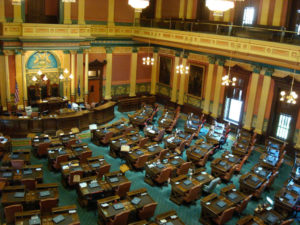 How soon will Michigan have a fiscal 2023 budget? Will it include the 10 percent boost in county revenue sharing first proposed by Gov. Gretchen Whitmer? What’s going to happen with the $3 billion in the still unassigned state American Rescue Plan funds?
How soon will Michigan have a fiscal 2023 budget? Will it include the 10 percent boost in county revenue sharing first proposed by Gov. Gretchen Whitmer? What’s going to happen with the $3 billion in the still unassigned state American Rescue Plan funds?
These and other questions are likely to be tackled in the next LIVE episode of Podcast 83 on Monday, May 2.
The update will begin at 4 p.m. To join the session, just use this Zoom link: https://us02web.zoom.us/j/82867692853.
Viewers will be able to ask questions of Podcast 83 team as well.
Last Monday, MAC Director of Governmental Affairs Deena Bosworth and Governmental Affairs Associate Meghann Keit-Corrion discussed the latest action on the FY23 state budget and some troubling legislation that would make major changes to the state’s Freedom of Information Act in a Podcast 83 episode recorded on Monday.
Watch a video of the session on-demand here.
Previous episodes in 2022 can be seen at MAC’s YouTube Channel.
And you always can find details about any Podcast 83 episode on the MAC website.
 Staff picks
Staff picks
- The promise and pitfalls of tearing down an urban freeway (RouteFifty)
- Senate Finance Committee releases report on mental and behavioral health (NACo)
- Michigan is spending big on infrastructure. Its problems are even bigger. (Bridge magazine)
- U.S. Department of Transportation announces $20 billion in FY 2022 for public transit systems (NACo)
House resolution names April as County Government Month
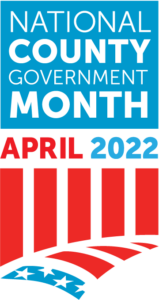 To mark National County Government Month (NCGM) in April, the Michigan House of Representatives on Tuesday passed a resolution drafted by MAC noting the key contributions that county governments make to daily life in our state.
To mark National County Government Month (NCGM) in April, the Michigan House of Representatives on Tuesday passed a resolution drafted by MAC noting the key contributions that county governments make to daily life in our state.
State Rep. Julie Rogers, D-Kalamazoo, herself a former county commissioner and former MAC Board member, sponsored the resolution and spoke on its behalf during a House session Tuesday afternoon.
“As a former county commissioner, I know firsthand that county governments play a vital role in the delivery of key public services in our state,” Rogers said. “Counties provide a variety of services, such as parks and recreation programs, services for seniors, medical care facilities, courts and court services, elections, and infrastructure. As a health care provider, I also appreciate the key role they play in public health by promoting equitable and accessible health for all residents.”
MAC Executive Director Stephan Currie thanked Rogers for her support: “Our members across Michigan greatly appreciate Rep. Rogers’ sponsorship of this resolution and its quick adoption by the full House of Representatives. Nearly 50,000 of our friends and neighbors work in county government each and every day to make our state a better, safer and healthier place to live. Such service is deserving of recognition this month — and every month.”
The NCGM celebration was begun by the National Association of Counties in 1991 to highlight the numerous and daily contributions of county government and employees to public life.
MAC members are encouraged to make use of a variety of NCGM resources:
- Sample proclamation form for county boards
- Social media resources
- MAC’s MI County Matters website
- NACo’s media toolkit
Podcast 83 interviews state mental health leader about threat to local control in Senate Bills 597-98
 Legislation that would bring in private companies to handle mental health services in Michigan would wreck longstanding local oversight and almost assuredly weaken assistance for those in need, a state leader in the field said during a special episode of MAC’s Podcast 83.
Legislation that would bring in private companies to handle mental health services in Michigan would wreck longstanding local oversight and almost assuredly weaken assistance for those in need, a state leader in the field said during a special episode of MAC’s Podcast 83.
Alan Bolter, associate director of the Community Mental Health Association of Michigan, discussed Senate Bills 597-98 with Meghann Keit-Corrion, MAC governmental affairs associate and point person on mental health issues.
MAC and CMHA are among organizations that have opposed these measures, which are backed by Senate Majority Leader Mike Shirkey (R-Jackson). First introduced in July 2021, the bills cleared a Senate committee last fall and are before the full Senate.
Use MAC’s advocacy platform to send a message of opposition to your senator. MAC also has a talking points sheet on mental health legislation for members’ use.
A poll commissioned by the Community Mental Health Association of Michigan and conducted by third-party survey provider EPIC-MRA found 67 percent of Michigan voters prefer the public mental health system to be managed by public entities who specialize in mental health care vs. turning the system over to private, for-profit companies.
Sixty-two Michigan counties have passed resolutions in support of local control and against SBs 597-98.
House subcommittees send budget recommendations for review
House subcommittees were busy at work this week sending recommendations to the full House Appropriations Committee for further review. Some highlights include:
- $149M in Michigan Indigent Defense Commission grants
- $175M for a statewide judicial case management system as recommended by the Trial Court Funding Commission
- $15M in federal funds to assist trial courts with processing base backlog ($7M of which must be used to create a virtual backlog response docket)
- $250M in federal funds for counties for improvements to existing jail facilities or construction of a new jail, with a 20% match and a cap of $25M per grant (it should be noted new jail construction is not allowed under the federal rules)
- $100M in federal funds to support radio tower grants, which includes a 20% match requirement and caps a cap of $25M per grant
- $57.5M for grant funding to eligible public safety entities to purchase years of service for out-of-state personnel who are hired in Michigan
- $15M for secondary road patrol
- $10M in grants to public safety departments for community policing programs
- $10M to reimburse local law enforcement officers for leave time they were required to use in order to quarantine because of exposure or possible exposure to COVID-19
- $10M to grant retention bonuses of up to $5,000 to public safety officers, first responders, local corrections officers, public safety telecommunicators, and juvenile detention employees.
- $10M in federal funds to grant signing bonuses of up to $5,000 to new public safety officers, first responders, local corrections officers, public safety telecommunicators, and juvenile detention employees
- $3M for a public safety and first responder recruitment marketing program
- $15M for the county jail reimbursement program
- 13M for community corrections program
- $4M for county veterans service grants
The Senate is expected to begin moving budgets next week and have them to the full Senate Appropriations Committee by the end of the month.
For more information on this issue, contact Meghann Keit-Corrion at keit@micounties.org.
Bills amending FOIA receive hearing in House Oversight Committee
Changes to the Freedom of Information Act (FOIA) could be coming from legislation introduced in the House. House Bills 5921 and 5923-25 seek to amend the act to limit local governments’ ability to defend denials of FOIA requests as well as increase the administrative burden and costs of compliance. Counties across Michigan consistently comply with the Freedom of Information Act and work with the public to ensure transparency and accountability in government. The provisions in the act require dedicated staff, on-going communication and compliance with requests. At the same time, the Act protects specific exemptions from record disclosures to safeguard personal privacy, legal investigations, attorney-client privilege information, certain appraisals and other similar exemptions.
MAC submitted a letter of opposition when the bills received a hearing in the House Oversight Committee this week outlying the following concerns with the package:
House Bill 5921, by Rep. Steve Johnson (R-Kent), limits the reason for FOIA request denial to only the ones stated in the beginning. This amendment could have the unintended consequences of releasing protected records if someone didn’t catch the right exemption the first time and could potentially force a local agency to violate other laws.
House Bill 5923, by Rep. Greg VanWoerkom (R-Muskegon), requires a written acknowledgement of a request within two days, on top of requiring compliance within five days, and in cases of a denial for a record, requires the public body to acknowledge the records, provide a description of the record and the explanation for the denial. These amendments will likely require legal counsel involvement in each record request denial as well and create scenarios where private information is being described without providing the actual record. In cases of mental health allegations, sexual assault allegations, legal opinions and law enforcement investigations, these disclosure requirements undermine the intent of the privacy exemptions.
House Bill 5924, by Rep. Andrew Fink (R-Hillsdale), requires that a record in the possession of outside legal counsel be considered to be in the possession of the public body. This amendment blurs the line over what is FOIA-able in an outside legal practice.
House Bill 5925, by Rep. Bryan Posthumus (R-Kent), allows for civil actions regarding the determination of whether or not the record is considered primarily for the public benefit and therefore should not be subject to fees for compiling the record. Again these amendments would open the floodgates of litigation against public bodies, especially by the press who would claim public benefit for every request. Then the public body would likely have to absorb the entire cost of fulfilling these requests to avoid litigation.
MAC is currently opposed to these bills as written but is ready and willing to sit down with the bills’ sponsors and staff to work on the legislation to achieve clear, fair and reasonable changes to the act.
For more information on this issue, contact Deena Bosworth at bosworth@micounties.org.
Opioid settlement rules gain swift action from legislative committees

A legislative package to manage the state’s $388 million portion of the national opioid settlement gained swift approval from committees in both chambers of the Legislature this week.
The House Judiciary Committee and Senate Health Policy Committee approved the bills that are designed to ensure Michigan receives the full $388 million over the 18-year settlement period, which begins in 2022.
House Bills 5968-69, by Rep. Mary Whiteford (R-Allegan), and Senate Bills 993, by Sen. Michael MacDonald (R-Macomb), and Senate Bill 994, by Sen. Mark Huizenga (R-Kent), create the Michigan Opioid Healing and Recovery Fund which ensure all money received under the national agreement is consistent with the settlement requirements. HB 5969 and SB 994 create the Opioid Advisory Commission in the Legislative Council, which recommends funding for initiatives that would support opioid prevention, treatments and services to the Legislature.
Whiteford stressed during her testimony how critical the bills are to prevent a repeat of what happened with the national tobacco settlement funds, which were diverted away to projects not related to anti-tobacco efforts.
HB 5970, by Rep. Christine Morse (D-Kalamazoo), and SB 995, by Sen. Betty Jean Alexander (D-Wayne), would bar local governments from future litigation related to the specific distributor and Janssen settlements. Under the settlement, a state must have a legislative prohibition against future litigating subdivisions (i.e., local governments) to receive the top incentive and the full amount of eligible funds.
MAC supports the bills based on our policy platforms, which call for state investment for treatment and services related to combatting the opioid epidemic and oppose a repeat of the spending outcome similar to that of the tobacco industry settlement.
The committees in both chambers passed the bills, on bipartisan votes, and the bills await action on the floor.
For more information on the national opioid settlement, visit https://nationalopioidsettlement.com/ or contact MAC’s Meghann Keit-Corrion at keit@micounties.org.
MDHHS opioid webinar on harm reduction set for next week
The Michigan Department of Health and Human Services (MDHHS), in partnership with the Michigan Municipal League (MML), the Michigan Township Association (MTA), The Michigan Association of Counties (MAC) and the Michigan Attorney General’s Office (AG) will be hosting a webinar series on the Distributor/Janssen Opioid Settlements. The next webinar will be held on Tuesday, April 19 from 3 p.m. to 4 p.m.
State, county and local governments are slated to receive funds from the Distributor/Janssen Opioid Settlements in the coming months, and this webinar series will provide an opportunity for local elected officials, public health officials and other relevant parties to learn about best practices for spending these funds. This upcoming webinar will focus on opportunities to support harm reduction services.
There will be a Q&A period during the webinar, or participants may email questions directly to MDHHS-OpioidsTaskForce@michigan.gov, prior to April 19, 2022.
Register in advance for this meeting:
https://us02web.zoom.us/meeting/register/tZcofuqhrzstH9EWwiYdZm2Zw0vOKo_C5x0E
After registering, you will receive a confirmation email containing information about joining the meeting.
MAC-backed road patrol funding bills clear House
 The House passed a package of bills on Wednesday to improve Secondary Road Patrol (SRP) funding via the state liquor tax.
The House passed a package of bills on Wednesday to improve Secondary Road Patrol (SRP) funding via the state liquor tax.
House Bill 5773, by Rep. Mike Mueller (R-Genesee), HB 5732, by Tommy Brann (R-Kent), and HB 5772, by Rep. David Martin (R-Genesee), would require that $15 million annually from the 4 percent excise tax on liquor go to SRP. At present, the fund receives a $10 assessment from civil infractions, so funding is dependent on the number of written traffic citations. Under the bills, the assessment levied on those traffic citations would be reduced by $10 (from $40 to $30) to account for the portion of the assessment that would no longer be distributed to the Secondary Road Patrol and Training Fund.
MAC supports these bills as they would create a more stable funding stream for sheriffs to finance road patrols. The Michigan Sheriffs’ Association supports the package, as well, as do a number of individual county sheriffs.
The bills are now before the Senate Appropriations Committee, chaired by Sen. Jim Stamas (R-Midland).
For more information on this issue, contact Meghann Keit-Corrion at keit@micounties.org.
Maintenance of effort measure gains House approval
 The Michigan House this week approved a three-year extension to the county maintenance of effort (MOE) rate for county medical care facilities (MCFs), a key legislative priority for the Michigan County Medical Care Facilities Council (MCMCFC).
The Michigan House this week approved a three-year extension to the county maintenance of effort (MOE) rate for county medical care facilities (MCFs), a key legislative priority for the Michigan County Medical Care Facilities Council (MCMCFC).
House Bill 5875, by Rep. Bronna Kahle (R-Lenawee), provides an extension to the MOE freeze until 2025, or until the Michigan Department of Health and Human Services (MDHHS) implements a new reimbursement model, whichever is sooner.
MDHHS has been studying and contemplating a new reimbursement model and policies for long-term care facilities. Should a new approach be implemented prior to Dec. 31, 2025, MCFs would transition to the new system under the bill.
Other organizations supporting the bill alongside MCMCFC include MAC, the Health Care Association of Michigan and Leading Age Michigan.
The bill now heads to the Senate Health Policy Committee chaired by Sen. Curt VanderWall (R-Mason).
For more information on this issue, contact Meghann Keit-Corrion at keit@micounties.org.
Podcast 83 discusses infrastructure, FOIA, courts and more
 Returning from a month’s hiatus, MAC’s Podcast 83 team reconvened on Zoom Monday to discuss the next phase of legislative activity in Lansing.
Returning from a month’s hiatus, MAC’s Podcast 83 team reconvened on Zoom Monday to discuss the next phase of legislative activity in Lansing.
Among issues discussed by Executive Director Stephan Currie and Deena Bosworth and Meghann Keit-Corrion of MAC’s government affairs team were the $4.7 billion infrastructure spending bill that’s heavy on water projects, troubling legislation to alter the Freedom of Information Act, the seemingly perennial battle over court funding and National County Government Month.
The team also took questions from members during the live session Monday afternoon.
Next Monday, Podcast 83 will broadcast a live session from MAC’s Lansing offices. The episode will begin at 4 p.m. and you can access it with this Zoom link: https://us02web.zoom.us/j/82867692853.
Viewers will again be able to ask questions of the team.
If you can’t catch the episode live, a recording will be posted later next week to MAC’s YouTube channel.
And you always can find details about any Podcast 83 episode on the MAC website.
 Staff picks
Staff picks
- Property buyouts can reduce flood impacts, but funding, planning hurdles limit their reach (Pew Trusts)
- Email fraudster hits New Mexico county for $447,000 (govtech.com)
- Profit strategy: (South Carolina) psychiatric facilities prioritize out-of-state kids (Kaiser Health News)
- Mechanic reaps windfall from art in Connecticut dumpster (Associated Press)

